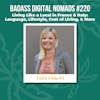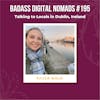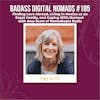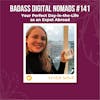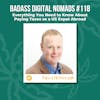Moving from the USA to Portugal: Highs, Lows, and Tips on Settling In

Find out the pros and cons of moving to Portugal with two California natives who now live in Portugal and run their online business, Bordr. Bordr helps people get their Portuguese tax IDs, file taxes, open Portuguese bank accounts remotely, and more.
Find out the pros and cons of moving to Portugal with two California natives who now live in Portugal and run their online business, Bordr. Bordr helps people get their Portuguese tax IDs, file taxes, open Portuguese bank accounts remotely, and other bureaucratic processes you need to go through when moving to Portugal.
Kathleen and Richard share why they chose Portugal as their home base, what it’s like to live there and have a baby there, and how they maintain friendships as a digital nomad family.
They also give their opinion on the downsides of living in Portugal and why they think other foreigners are moving away.
Plus, they break down Bordr’s relocation services and prices, giving you insight into how they can help your move go smoothly!
Special Offers:
- Get $10 off any Bordr Portugal service!
- Find a remote job with FlexJobs (use code SAVE30 to save up to 30%)
- Buy Digital Nomads For Dummies
- Subscribe to Kristin's weekly e-mail list
Topics Discussed:
- Portugal’s healthcare system & Having a baby in Portugal
- What inspired them to leave San Francisco and move abroad
- Co-living in Taipei, Thailand
- Living in Portugal as an Asian-American family
- Downsides of living in Portugal (why they might leave)
- Cultural differences and culture shock in Portugal
- How social dynamics have changed since the pandemic
- Maintaining friendships as digital nomads
- Transitioning from freelancer to business owner
- Portugal’s d7 visa / Digital Nomad Visa
- Bordr Services + Prices: Tax ID/NIF, opening a Portuguese bank account remotely, NHR tax consultations, and more!
Questions Answered:
- What is your neighborhood like?
- Why did you choose Portugal as your home base?
- What places did you visit while slow traveling as a digital nomad?
- What is it like to have a baby in a foreign country?
- Why do you love living in Portugal more than other places?
- Are Portuguese people welcoming to foreigners?
- Are Americans ruining Portugal’s housing market?
- Why and how did you transition from freelancing to entrepreneurship?
- and more!
Episode Resources:
Recommended Videos:
- Best Places to Live in Portugal for Expats and Digital Nomads
- THIS Is How Much It Costs To Live in Portugal Now (in 2023) 🇵🇹
- First Month Living in Portugal as a Digital Nomad (Pros & Cons)
- Living in Portugal (Playlist)
- Japan Travel Videos & Travel Vlogs (Playlist)
- Top 10 Best Places To Live Well on $1,000 Per Month
- Asking 10 Digital Nomads How They Make Money Online from an Island
Related Podcasts:
- Inside the Real Bangkok, Thailand with Erick Prince, The Minority Nomad (Part 1)
- Inside the Real Bangkok, Thailand with Erick Prince, Minority Nomad (Part 2)
- How To Move Overseas With Confidence - Bigger, Better World
- Renouncing Your US Citizenship Part 1: Living Abroad in Canada With Erika Lind
- How to Renounce Your US Citizenship: Part 2 (+ YouTube Drama)
Connect with Kristin and Support the Show:
See the show notes pages on BadassDigitalNomads.com or TravelingwithKristin.com/podcast for more details.
Sneak Peek:
Richard: 00:00:00 There's a cultural difference where you try to work with someone in August and you wanna get this deal done, you wanna buy the house, whatever it is, it might be shocking to an American that, oh, the person's gonna go on vacation for the whole month. And yeah, your business is not that important. <laugh>
Introduction: Welcome to Badass Digital Nomads, where we're pushing the boundaries of remote work and travel, all while staying grounded with a little bit of old school philosophy, self-development, and business advice from our guests.
Kristin Wilson, Host: 00:00:40 Hey there, Kristin, from Traveling with Kristin here and welcome to episode 228 of Badass Digital Nomads. If you are interested in traveling to or living in Portugal, then this is the episode for you. My guests today are Kathleen and Richard Lo, who are former web designers from San Francisco, California, who now run an online business from Portugal that helps people get their Portuguese tax IDs, file taxes, and all sorts of other, uh, bureaucratic activities that you would need if you are moving to Portugal getting residency there. And in the future, they will also be helping with getting the Digital Nomad Visa. So I talked with them about why they chose Portugal as their home base, how it's been living there. Also having a baby there. And also talked about the downsides of living in Portugal and why they think that other foreigners are moving away. And I even asked them if Americans are ruining Portugal based on all of the media controversy lately on digital nomads and Americans being the reason for increased housing prices and cost of living prices in Portugal.
Kristin: 00:02:04 So getting a little controversial today, but we're also gonna be bringing you a lot of great value and insights about their experience living in Portugal and also how you can live there too. And if you're interested in getting some of their services that they offer at Bordr, then you can get a $10 discount on any service by using our referral link in the show notes. And before we get into the conversation, I would like to say thank you to Josephine who left such a nice review on our podcast. She says, Kristin is the gentle motivator. I'm so glad I found this podcast because I feel totally lost. I've ended up in Spain and my job assured that I could continue after I got here, but I'm currently scrambling to figure out what to do. And this podcast covers all of the topics that keep me up at night. I'm starting to feel more hopeful that I'll find a way to get by and stay here. Thank you so much Josephine, for your five-star review and I am so happy that the podcast has helped you with making sense of these topics and giving you some guidance there. So feel free to reach out to Hello@TravelingwithKristin.com if you have any questions and keep listening and we will keep showing up for you here every week. Enjoy my conversation with Kathleen and Richard and see you on the flip side.
Podcast Interview:
Kristin: 00:03:38 Well, welcome Kathleen and Richard to Badass Digital Nomads. So great to have you here and I know we've been wanting to have you on the show for almost a year now, so welcome, welcome, welcome. And where are you joining us from today?
Kathleen: 00:03:51 Yeah, thanks for having us. We are calling in from Lisbon, Portugal.
Kristin: 00:03:56 Oh, great. And which neighborhood in Lisbon are you in?
Richard: 00:04:00 Uh, we live in Campano. It's in an area that they call Avenidas novas. It's kind of like in the center of the city.
Kristin: 00:04:07 Okay. And have you been there throughout the whole few years that you've been been there or have you moved around?
Richard: 00:04:13 We've moved around quite a bit. So when we first came to Portugal, 2020
Kathleen: 00:04:20 February, 2020.
Richard: 00:04:21 Oh wow. Fast,
Kristin: Oh my gosh.
Richard: February, 2020, right before Covid we were staying in a, um, in a neighborhood called Penha de França. And then we've kind of hopped around all over the place. During Covid we were like, Lisbon's kind of dead, let's just check out the country. So we went down to the Algarve, we went to the Silver Coast, we went to Porto. Kind of like city shopping I guess. Yeah. And then, and then uh, we eventually came back to Lisbon and we lived in Cappo, I mean Campano now, but we used to live in um, Campodrick for a little bit over on the western side near Estrela. But we've been here in this neighborhood now for what, a year and a half?
Kathleen: 00:05:02 A year and a half. Yeah, a year
Richard: 00:05:03 And a half --
Kristin: 00:05:03 Or so. Okay. And what is your neighborhood like there? I haven't heard of that area.
Kathleen: 00:05:08 Sure. Oh yeah, it's nice. It's, um, it has everything you need. It has really good ac, it's flat <laugh>, um, which is nice in Lisbon, uh, especially since we, we recently had a baby, so we really appreciated flat roads a lot, um, lately. But it has really good access to public transit, bike lanes, nice walkable streets. It has a good mix of commerce and residential areas. So yeah, it's nice 'cause it's lively but not too touristy. <laugh>,
Richard: 00:05:44 but with the trains it's really easy to access anything.
Kristin: 00:05:48 Okay, so to get like around the city and everything.
Richard: 00:05:51 Yeah, we can do within the city for like the metro, but if we can also take the, the larger train which goes intercity so we can pretty easily like go to Cintra or go to go to Porto even.
Kristin: 00:06:02 Oh nice. Yeah, very convenient. And are you in uh, an apartment or a house or a townhouse?
Richard: 00:06:08 Uh, we're in an apartment, a two bedroom.
Kristin: 00:06:10 And do you guys rent there or did you buy property?
Richard: 00:06:13 We're renting.
Kristin: 00:06:14 Okay, awesome. Well you have been in Portugal now since the pandemic started and clearly you love it because you started this company called Bordr, which helps other people move there. So we'll get into that a little bit later and how that works and why people would need help with these visas and how you help them. But how did you end up deciding to go to Portugal? So I know that you guys are from San Francisco. Give us a little bit of insight into your lives there and what kind of inspired this decision to travel?
Kathleen: 00:06:51 So we both used to be based in the San Francisco Bay area in going back to, we used to work in tech like in the Bay area. And then we started working on our own business back in 2016. Richard and I um, started working on a web design business together. And after about a year of running that we realized that we never really met with any of our clients in person. And so around 20 mid 2017 we had this idea that we wanted to work and travel and we actually weren't that familiar with the concept of digital nomads at the time. We just had this idea that, you know, we had the flexibility so we wanted to take that opportunity to explore. So yeah, basically once the business felt more stable, we decided to sell our cars, get rid of our lease, pack up our stuff.
Kathleen: 00:07:42 The original plan was to travel for a year. We had listed out cities that we wanted to experience living in. Um, we had planned out, you know, like one city per month and started our journey in 2018. So that first year we did exactly that. We hopped around, we were in a new city per month. We started out in Chiang Mai, Thailand. We went to Bali, Tokyo, Berlin, Porto. And then actually we didn't complete the first year. After doing that for a few times, we realized how tiring it actually is to be hopping around so frequently and also trying to work and run a business. So the second year we slowed down and we wanted to continue traveling, but we found it to be a lot more sustainable to do two to three months at a time in different cities. And so after doing it for the second year, coming up from the third year, we were like, oh, you know, it would be nice to ha take it even a little bit slower. Uh, so we were looking for a home base and that's how Portugal came about.
Richard: 00:08:42 Yeah, I think at that point I was really missing cooking and having like a nice kitchen and whatnot. Like it got to a point where we were traveling with like a carbon seal pan, a chef's knife, a chopping board, <laugh>. I was like really sick of, you know, the uh,
Kristin: 00:09:01 The Airbnb kitchen.
Richard: 00:09:02 Not super well equipped Airbnbs. Yeah, like you can only use those IKEA knives and the Ikea chopping boards so many times. You know,
Kristin: 00:09:09 I was just sharpening my knives this morning <laugh> because I'm like, oh, can't even cut this cantaloupe, <laugh>.
Richard: 00:09:15 You know? For sure You get it
Kristin: 00:09:16 For sure.
Richard: 00:09:17 Yeah, you get it. Yeah. So the original plan, 'cause this was pre Covid, we were thinking, oh well maybe we can have a home base where we spend maybe six to eight months per year and then spend the rest of the time traveling. So that would give us like that good mix of like a home base, but then also exploration. When we were doing our research initially we were like, oh, and friends and family back in the US were like, oh, you guys should come back. Like you said you would come back after a year. Now it's been almost two years. What, what's the plan? You know, we thought about it, we decided that the Bay area didn't make sense to go back to mostly because of the high cost of living. And after traveling around everywhere else, we were like, oh, well we can live a pretty high quality life <laugh> for much less than than that. So then we started looking at smaller cities and there were a lot of people moving to say Denver and Austin around that time. Seattle a bit as well. So we were really considering, we visited Denver and we were really considering it. And when it came down to it, Kathleen was, I was talking to her about it and Kathleen's from the Philippines and obviously the, the weather there's much warmer. And then we lived in California where the weather's like pretty nice all the year. So
Kristin: 00:10:28 having Denver on the table was very intimidating
Richard: 00:10:29 when she was like snow?? <laugh>.
Kristin: 00:10:32 Yeah.
Richard: 00:10:33 And uh, she was a little bit hesitant. So then I just opened up my search to where can Americans stay longer term anywhere? We weren't sure where we could stay that, that felt like the biggest criteria. 'cause we weren't, you know, we, we really enjoyed our time in Thailand, but we, we knew some friends that were doing like student visas, like martial arts study visas. And then we had also heard about retirement visas, which had age minimums. And us being still, I think both of us were still below 30. We were like, well we can't qualify for that 'cause 'cause we're too young. And so when I just started Googling and then Portugal's D7 Visa came up as an option and it wasn't clear yet. It wasn't, it didn't, I don't think the wave of Americans moving to Portugal hadn't quite started yet. So we reached out to a number of firms, like agencies and law firms and asked them, hey, like can we qualify for the D7 with our web design income?
Richard: 00:11:29 You know, all of our clients are in the United States, we work remotely, all these things. And we got very mixed answers. Some people were like, no, because you're active income and you need to apply in the digital nomad visa. Didn't, um, exist back then? So then they were saying, you need to apply as a freelancer or open a company in Portugal. And then we found one firm that was like, yeah, I do this all the time for people. So we figured why not? Like, there's nothing for us to lose. Let's give this a try. And we really enjoyed our time in Porto. I had a college friend living in Lisbon at the time, who we could get, he, he bought an apartment so I could, um, we could rent a room from him for that requirement. And then we figured why not, like give it a try because worst case scenario, if we don't like it then we just don't have to renew our visa. Best case scenario, we stay the five years minimum and get the passport and then, you know, have a lot more flexibility in Europe as well. So we figured we had nothing to lose so we wanted to give it a try. And I guess, uh, we really enjoyed it. So we're still, 'cause we're still here,
Kathleen: 00:12:27 It's been three and a half years. It's crazy to think that we've been living in Portugal for longer than we were like nomadic <laugh>.
Kristin: 00:12:33 Yeah. And what were some of the other places that you went back in your second year as a nomad when you decided to slow travel? Did you go to new places or did you go back to the places that you like the first time when you were doing your faster pace of travel?
Kathleen: 00:12:50 Yeah, for sure. We ended up going back to Chiang Mai a lot. That was like a very consistent base that we would always go back to. But the other places that we spent longer amounts of time in were actually new. So we went to Taipei for three months. We went to Medellín Columbia for two months.
Richard: 00:13:08 I think we kept going back to Chiang Mai and then we,
Kathleen: 00:13:10 that is really what happened.
Richard: 00:13:10 <laugh>. Yeah, we went <laugh> because I think, I think with Chiang Mai, I think so
Kristin: 00:13:12 You're doing the Visa run.
Richard: 00:13:14 Yeah, exactly. Uh, and we were able to get like three month visas, but even then it's like we, we really felt like a strong sense of community there. We did our yoga teacher training there, so we had like our yoga friends and then like the digital nomad community was so strong and you know, it was cool 'cause like once you kind of met your, your people, like they would introduce you to other people or people are constantly coming back. So it just felt like constantly seeing the same faces and friends and whatnot. So we really enjoyed that aspect of living in, in Thailand.
Kristin: 00:13:46 Do you still keep in touch with 'em or do any of them pass through Lisbon?
Richard: 00:13:51 Yeah, for sure. We've had four or five people come stay with us for like, at least a week.
Kristin: 00:13:56 Oh great. Yeah. And how was living in Taipei? I haven't been there before.
Kathleen: 00:14:01 Oh, Taipei was really cool. Um, we had a really special experience, so living there, we ended up living in a share house, which is like a shared accommodation where everyone has their own rooms, but you have shared facilities like shared living room, kitchen, laundry area. And so there's a lot of just like interaction. So there's a, it was a, it was actually mostly Taiwanese people who live there, A lot of people who, you know, are from the, like farther cities and provinces, but work in Taipei, it's a lot of young professionals. And so that was a really special time. It felt a lot like college, um, where, you know, you, you're just like all young hanging out, you do your own things during the day, but we would like have hot pot together or go do things on the weekends together, go check out a bar. So it was a nice mix. And they were also like local from Taiwan. So then they showed us a lot, like we learned a lot from them. <laugh>,
Kristin: 00:14:57 What would you say your cost of living was there?
Richard: 00:15:00 Oh man, that's a great question. If you had asked me this before, I could actually give you the numbers because we, we have like an Airtable base of all of our expenses. <laugh> from that time, I forget exactly our total cost of living.
Kathleen: 00:15:11 We actually know like our average expense, like per city, per
Richard: 00:15:14 Per city. We, we like had a-- a chart, you know.
Kathleen: 00:15:16 Um, but in Taiwan I would say that because we lived the, one of the reasons why we ended up living in that shared accommodations was because accommodations are quite expensive in Taipei. And so if we had rented our own apartment, it would've been a lot more like maybe double the price of what we were paying for our room in that house.
Kristin: 00:15:36 Yeah, that's interesting. That's the same experience I had in Tokyo. And I didn't really find anything that I wanted. And I felt like being in such a country that has such a different culture to what I was used to, I felt like it would be better to be around more people. And so I ended up living in a, a co-living building where we all had our own apartments, like our own studio or one bedroom apartments with a bathroom and everything. And I even had a little kitchen, but then downstairs we had the common areas and it was mostly locals, so mostly Japanese people and then maybe, maybe like 20% or 30% foreigners. And, uh, of all different ages, there were like professors there who were on sabbatical and people who were retired or semi-retired and travel writers. It was a really interesting group of people.
Kristin: 00:16:33 And I just came across some of those old video clips the other day when I was editing and I was feeling so nostalgic about that time. It really is a special time when you get to travel with people and you see photos, you're like, oh, whatever happened to that person, or I wonder where they are. So it is, it's important to, uh, keep in touch. But then there's these other phases, as you mentioned. You go through this journey after making the decision to leave your home country and your life just evolves over the next few years. And it's like going through all of these different lifetimes almost where yeah, you're nomadic and then you're slow traveling and then you're in Portugal having a baby and who knows what will happen another three and a half years from now <laugh>.
Richard: 00:17:21 Yeah, yeah, yeah. That's super.
Kristin: 00:17:23 And how was your experience having a baby in Lisbon? How did you find the healthcare system and, and that whole experience?
Kathleen: 00:17:31 Yeah, I think we were very fortunate to have a very positive experience. Of course when we, it was, it was planned. And when we actually did find out that we were pregnant, of course there is a little bit of anxiety around being in a foreign country and you know, not having, let's say your go-to OB that was recommended by like a trusted friend or a family member. So that was definitely something that was, it was quite big to deal with. But I would say that one decision that we made that helped tremendously was deciding to hire a doula initially. Like what prompted it initially was a language barrier and us being concerned that, you know, being in a high stress situation of giving birth in Portugal where we don't speak the language well enough, we wanted someone to be there who would be able to, you know, just like be on our side and be able to like translate for us.
Kathleen: 00:18:25 So we ended up hiring a doula who's bilingual, Portuguese and English, but she ended up being so much more, she ended up supporting us throughout the pregnancy and preparing this is our first baby. Um, so that was also an entirely new experience for us. And so she, you know, prepared us, helped us figure out like what questions to ask. She helped us find a doctor to work with the hospital to deliver and then was just there throughout, you know, throughout the labor, the delivery, and even like the few weeks postpartum. And so that was, she was a life saver <laugh>. Um, and it was overall a very positive experience.
Kristin: 00:19:05 And did you find her online or through other people that, you know, that were living in Portugal?
Kathleen: 00:19:11 I ended up finding her through Facebook groups.
Kristin: 00:19:14 Oh, Great. See, Facebook groups can be very helpful. So you're clearly committed to living in Portugal. Uh, what do you love so much about living there compared to the other countries that you've been to? This is a, a country that is very prominent as a destination for people from around the world who are looking for good weather, good lifestyle, reasonable cost of living. But what do you like the most about living there?
Richard: 00:19:46 Yeah, I think that initially those were the things that drew us to Portugal because at the time we didn't, we didn't know much about Portugal, Portuguese culture, Portuguese people. We had just spent one month in Porto. So it's like not long enough to really understand what we were getting ourselves into. I think initially, especially coming from Asia, we were looking for good weather and clean water from the tap <laugh> that we could drink. Um, safety as well. And then I think that as we came to Portugal, some things that we've really enjoyed here are, I think like the quality of ingredients, like food, as I mentioned earlier, we like to cook a lot. So you know, the produce, the produce is really good. You can go to butcher's, you can go to like the, the fishmonger and like, you know, we've learned all different types of fish.
Richard: 00:20:39 We've learned how to cook different, like new styles. That's one big piece. And another big piece is like the people are super accommodating and friendly and welcoming. Like it's, it's funny 'cause we kind of expected because we are of Asian descent, that we'd be, I don't know, treated differently in, in some way, but walking around, going to like a local thca, which is like a, you know, like a local restaurant, like corner restaurant kind of thing. Or like the, the market where people only speak Portuguese. Like, it's really funny because they just, Portuguese people just kind of like talk to us as if we are local and <laugh> it's like, of course, you know, I, and, and so I, I think because of that, we feel very welcome here as well. That's probably the thing that's probably kept us here. All the other things are true. It is nice, nice weather, you can't drink from the tap, whatever, whatever, all all, all those things. But I think the on the day-to-day, it's more like people are pretty friendly, which with each other and you know, we walk down the street, we say hi to everyone, like people, we, we kind of have like our people that we know now. So it, it's kind of like what we were talking about earlier with Chang Mai it kind of, we feel that sense of community.
Kathleen: 00:21:50 Yeah. And the cool thing is that it's always been like that, like it was like that from the very beginning. There wasn't like a peer good where we felt unwelcome and it took some time to like break in and meet the people. I'd, I'd say that people were very warm from the very beginning. And so that's been really nice.
Kristin: 00:22:06 I'm glad you mentioned that because there's been a lot of controversy in the news about, especially with a few thousand US citizens moving there and a lot of tourism in Portugal that digital nomads and foreigners are somehow ruining Portugal and, and making everything more expensive, making the housing more expensive. What is your perspective on those claims? Do you think that they're overblown in the media? Clearly there's problems with housing and the prices there and a cost of living crisis that has affected many countries, but what is kind of your finger on the pulse on the ground among the locals? Are they, you know, flat out blaming people who are coming over and getting the D7 visa? Or are they more looking to the government for just general solutions and not pointing fingers necessarily at Americans or at nomads?
Richard: 00:23:09 That's a really interesting question. I, I think personally speaking, haven't experienced any sort of resentment firsthand. Not to say that that doesn't exist, it's just we haven't experienced it ourselves regarding like price increases, housing and whatnot. Like these are definitely true. I guess like, it's a little bit hard for us to, we don't have a very strong stance on it because I, I see it more as like a complex system. So it's like, it's easy to point fingers at one thing. But even like the golden visa situation where the argument most recently this year was that the golden visa investors were jacking up their prices and this and that. It, it was a bit strange because since the beginning of the year, they already removed the real estate options from the most popular cities and the coastal towns. So it was, it didn't seem to make that much sense.
Richard: 00:24:05 So I don't really know what, like, if, if you can point pinpoint one. Cause I mean of course tourism is a big thing. If you, if you just look at like the, just purely from a financial perspective as an investor, if you want to invest in a property and rent it out on Airbnb versus invest in a property and rent it out on the long-term market, you're looking at, like, you can get like double the return on Airbnbs. So as a person who's investing in real estate, of course they're financially incentivized to Airbnb out the apartment. Now the downside for the local population in that situation is, well this is gonna be too expensive, it's not gonna be accessible, it's not gonna be available for the local market. And then all of a sudden, where does the local market live? Right now the government is counteracting that by, you know, not issuing new licenses or making it very difficult or when, when you purchase a property like the, the license could expire. So it seems like the government is doing something about that. I think there is some noise around the foreigners moving to Portugal in our experience, like, and also speaking with other, like locals on the ground who have worked with foreigners. It's funny because from their perspective they're saying like, okay, right now the Americans happen to be the big wave, but we've had waves before. We've had the British, we've had the, the Germans, we've had the Scandinavians,
Kristin: 00:25:37 Russia, China.
Richard: 00:25:39 Yeah. And, and so from those people's perspectives it's like nothing's really new here. You know, on the other hand you do have people who can, who want to pinpoint and blame all the golden visa investors, blame all the, the digital nomads, the, the tourists, right? There's probably some truth to it, but I I also don't know if it's like entirely if you can really just point pinpoint like one, one group and say it's your fault.
Kristin: 00:26:04 Yeah, I agree. I mean, I don't know if there is an answer to this question. I just was curious about your perspective there. And I haven't come to a conclusion myself. I'm just kind of asking around and seeing what, what people think and, and still researching. And I think it would, it would be helpful to look back historically at the market in Portugal and Lisbon especially, and see what has evolved there. But as we know, the prices of housing escalate over time, you know, they go up and down, but long-term trends as everything gets more expensive with inflation and for so many other reasons. So yeah, I think it's probably a combination of things as well. And it doesn't seem like, I mean, it would be, it would be too simplified to say that it's just one group of people that's doing it, especially if it's only 4,000 people, uh, out of the whole country, <laugh>.
Kristin: 00:27:07 So I think probably the, the tourism with Airbnbs and short-term rentals is a bigger impact. And this is something I've looked at in Bali as well, right? Where, you know, the number of dig digital nomads is infinitesimal compared to, you know, the number of annual tourists that come from one country like China. So yeah, it's, uh, you know, we're having an impact in our own way, but hopefully it's also a positive impact. And in the absence of tourism, which so many countries rely on for their economy, what would take that place? It would probably be something in agriculture, maybe fishing, maybe some sort of raw materials. I'm not sure. But tourism is also a big economic driver. So it's, it, everything that you do, every action has a reaction. There's always pros and cons to everything. So it's part of our jobs as humans and, and definitely the government to try to fix these problems and make everything sustainable. So we'll see what happens, uh, in the next few years, but in the meantime, I think, you know, it, it's unrealistic for people to just stop going to Portugal <laugh> because it's such a great country. So I think we'll still continue to see a lot of people wanting to go there and, uh, and experience that lifestyle.
FlexJob:
Kristin: 00:28:38 Kristin, here, are you looking for a new job and one that will let you work from home or work from anywhere? If so, give flex jobs a try. Flex Jobs is the biggest site in the world for hand screened, remote freelance, and part-time jobs. A FexJobs membership makes your remote job search faster and easier as they have remote, hybrid and flexible job listings. And more than 50 different categories ranging from entry level to executive. So whether you want to transition to a remote job in your career field or find something completely new, flex jobs can help. You can try flex jobs today and save up to 30% by using our link in the show notes with the code SAVE30. That's with the code S A V E 3 0 using our link in the show notes.
Kristin: 00:29:37 What about the, the downside? So there's been a lot of videos coming out about, you know, Portugal isn't what I thought or why I'm leaving Portugal, or why I left Portugal, or why Americans are leaving Portugal. There's kind of this trend in, in videos, which I can't really talk, 'cause a few years ago I made a video about why I left Costa Rica. So clearly this is, uh, you know, something that a lot of people are, um, wanna talk about. But what do you see from that other side of people who decide to leave? Or are there any, I mean, there's gotta be challenges everywhere that you go and pros and cons. So what would you say from the other side that you've experienced?
Kathleen: 00:30:18 Well,
Richard: 00:30:18 I have a lot of thoughts on this, but if you wanna go.
Kathleen: 00:30:20 Yeah, well no place is perfect. I personally think that a lot, like sometimes people have a tendency to think that maybe Portugal is this perfect place and you know, like, we'll solve all your problems. But yeah, as I said, like no place is perfect. Every place has, it has its pros and cons I guess as much as Portugal has the nice weather, the warm people, all the good things. There are of course cons as well and things that aren't ideal. So I guess a few things that come to mind are the bureaucracy and the pace of things. So let's say if you're looking for, if you're used to a certain, like pace and efficiency, for example, like if you're coming from the United States, um, and you're used to like a certain like, level of customer support when dealing with businesses or response time, you know, Portugal is a lot more laid back and like in the summers people take vacation and things might just like take longer than ex than than you're used to. So that's, I'd say that's one really big adjustment. Um, even personally when we moved and we encountered some of these things ourselves, we were like, Hey, we just had to remind ourselves and laugh about it and say like, hey, like, you know, when you move to a new place, like you sign up for all of it, you know, you can't just get the good things. You also have to be ready and prepared to deal with the things that aren't so ideal. Yeah.
Richard: 00:31:45 It's like people come and something that's really attractive is the relaxed, lower stress, slower pace of life. And it's funny 'cause I think people just imagine that, oh, like that's what I want when I'm vacationing or when I'm trying to relax. So then they get really frustrated when they're trying to get something done <laugh>, and it's like, hold up, you sign up for the whole package. Okay, <laugh> you can't, you can't get one without the other. And so I think that's been, especially as Americans where in the US it's like, so consumer, like we mastered consumerism, right? Yes. The customer's, number one, you can get whatever you want whenever you want at the cheapest price, you get the maximum number of options and then you can use the thing. And if you don't like it, you can return it for a full refund. <laugh>, you know, like, I think as Americans, we think that that's normal and it's really not.
Richard: 00:32:39 Once you've like traveled everywhere, it's like you go to a store, sometimes you buy something, you change your mind. Can I return it? Like, no <laugh> like, you haven't even left the store yet. You bought it, I took the money, I can't return it. You know? Yeah. So I think that like, if you're accustomed to the, the shallow version of this is like, if you want Amazon, if you want an Apple store, sorry, Portugal doesn't have these things. Like we have an Amazon Spain account so we can ship order things from Spain, right? So from a, from a pure, like can I buy things perspective, it's, it's way less convenient. But I think that's more of a symptom rather than the root cause, which is more that there's a cultural difference where you try to work with someone in August and you wanna get this deal done, you wanna buy the house, whatever it is. It might be shocking to an American that oh, the person's gonna go on vacation for the whole month and yeah, your business is not that important. <laugh> Yeah.
Kathleen: 00:33:36 Because they're unreachable for that whole period. <laugh>
Kristin: 00:33:39 And the whole country might be on vacation
Richard: Exactly.
Kristin: At the same time.
Richard: 00:33:43 Exactly. Yeah. So I think there are some cultural differences in that sense. I think another challenge that people have, I guess I'm trying to put myself in the position of like if I, if if we were to leave, what, what are the, the reasons? This goes back to the, the people, the culture part. I think people are really friendly in like a day-to-day environment. But at least for us, and I don't know if this is generally true, but a lot of people say it, so maybe there's some truth to it. It's been harder for us to build like deeper connections with local Portuguese people. It, it almost feels like we have like the, the really nice, like see you at on the day-to-day level transacting and, and just like saying hello, but kind of breaking that barrier to like inviting someone to your home or, you know, like in Chiang Mai for example, like we went to the wedding of one of the people who worked at one of the coffee shops that we went to, right?
Richard: 00:34:42 And so like, and we also went to a wedding of like, uh, one, the people in our yoga studio that we did our teacher training with. So it's very different. We haven't been to a Portuguese wedding, <laugh>, I can say that. <laugh>. Yeah. So there might be something there where, where one doesn't feel super at home perhaps. I think it really depends on your, your, your living situation before. If you're coming from the United States where you've lived for the past 30, 40, 50 years, whatever it is, and then you come to a new place and you expect to have the same types of human connections, that's really hard to beat. Right? I think for us it was, after traveling for so long, we kind of got accustomed to this new style of friendship, which was like, we can go really deep, like now, and then it might be like months, maybe years before we'll see each other again. But, but we, like, we don't have to see each other every day to have that depth of a relationship, you know? Yeah. I I think now we, we, we treasure the, the relationships or the friendships that we can go really deep, deep in with people and we don't expect it or so rather if we find that we're not going super, we're finding like really deep, like what we'd call meaningful connections. We're not as bummed out by it.
Kristin: 00:35:58 Mm-Hmm. <affirmative>. And have you had those with the foreigners that you've met in Portugal, or have you found it's quite transient?
Richard: 00:36:10 Um, no, I think, Well there's so many people moving to Portugal, <laugh>, um, and through through Bordr we've also been able to meet a lot of people that we work with. So I think we've been able to develop those deeper connections with, with foreigners more easily. it's just different. Like, I think in some other parts of the world we, we had closer connections or it was, it was more of a mix between foreigners and, and locals. And I, I think unfortunately in our experience so far, we, we, we don't have as many deep ties with, with locals here in Portugal.
Kathleen: 00:36:42 Yeah. I also wonder if a part of that, part of me feels like a part of that also might be because we moved right before Covid, so literally like our first year and a half, almost two years, we just didn't have the opportunity to like integrate, you know, to, to do things outside. Like normally when we move to new, when we're living in a new city, we'll work in coffee shops, we'll go to, we'll try to go to some events, find a yoga studio. But because of the lockdown we were just at home <laugh>. And so once that becomes your normal, you know, after like a year and a half, we didn't really seek out those normal activities afterwards.
Kristin: 00:37:23 I think that's a really good point. I kind of feel like the social dynamics in the world changed since the pandemic because it almost seems like everyone is a little bit more independent. I mean obviously, you know, we still have friends and we still interact with people, but people feel very empowered to just kind of do their own thing, <laugh> and isolate themselves.
Richard: 00:37:51 I guess we were forced to for quite a while. <laugh>. Yeah.
Kristin: 00:37:54 I noticed people just kind of like disappearing off the map for a while and doing their thing and then kind of showing back up and social media or something. And so I think that that's been the dynamic that I've noticed. And also that we just got really used to being at home all the time. And especially when you work online or you work from home, you run your own business. It's like you could be working every hour of the day. I just listened to an interview with Mr. Beast this morning and he was saying how he feels guilty if he's not, doesn't work for an hour. And you know, he could work 24 hours a day. So there's also this other kind of, well, very US driven like rat race, overwork element of it as well, coupled with two years of relative isolation for almost everyone.
Kristin: 00:38:45 And then the increase in technology that allows us to get things that we need delivered and communicate with people without ever meeting them in person. And all of that added together on top of when you go to a new country and you're making new friends while working full-time and having a baby, it's like right <laugh>, you know, we're busy. People are busy, especially when you have kids. And so it, it can be challenging and even for me who I don't have kids, like being here in the UK for four months, I have started to feel like, you know, maybe I haven't, I have a lot of acquaintances now. But there was even like one guy who I met and he was having his birthday party and it was like, I was sort of invited but not invited <laugh>. I was like, oh yeah, you can come if you want, but you know, you're not gonna be
Richard: 00:39:37 <laugh>. So so do I invite myself at this point or what's going on
Kristin: 00:39:41 <laugh> Yeah. I'm like, should I go? I don't know <laugh>, but yeah, you, you're not gonna be like the same status as their childhood friends. And I felt that in Costa Rica as well, although I did have local friends there, but I lived there for eight years, but I still felt like I'm never gonna be on the same level. These people went to high school together and middle school together and they grew up here and like, I'm just never gonna crack into that exact bubble. But on the other hand, I've been invited to weddings. My roommate who I lived with in Australia, a gay couple that I met in the Netherlands went to their wedding and so it does also depend on the culture and I think my friend Eric Prince who lives in Thailand, who speaks pretty good Thai and has been there for a real, a really long time and we had some interviews on our podcast, he would definitely say that that experience in Thailand, like it's easier to really immerse yourself and kind of like go with the flow of the culture there and feel more welcomed.
Kristin: 00:40:40 And that has to do with, you know, the structures of these societies. So maybe it is a little harder in some of the, the Latin countries, even though they have a collective society, maybe that works better for them. Yeah. As locals and not, not so much for the foreigners, but, so I have two cousins who live in London and they've lived there for years now. And I also have noticed a difference since the pandemic with them. It's like, even though we're in the same country, I don't really see them that much because they have their own lives going in London. And it's almost like, yeah, I'm just a visitor here temporarily. Like now, like both of them are married, one of them just had a baby and they have a whole other social circle of friends that I don't know. Yeah. you know, we grew up together in Florida, but that was 20 years ago and now they live here and they have different friends and it's just kind of like, it could even happen that way, uh, with family members. So it is an interesting dynamic. I wonder how fast forward 10 or 20 years from now when more people are are migrating, I wonder how this will be, but it probably has something to do with these kind of traveling groups of nomads and co-living and people who are remote and they're able to travel back to places year after year, like you were mentioning in Chiang Mai and just kind of keep those connections and different countries and see each other maybe once every couple years. But you still maintain that friendship. What do you think?
Richard: 00:42:16 Yeah, yeah. I think at least for us, that has kind of proven itself to be true. I think that some foreigners will find a place and say, this is home. So we have some friends who are like Chiang Mai for life, and then we have other friends who are more similar to us where it's just like, Chiang Mai has a special place in my heart and I'll always come back. So what's interesting about that is the, the people who have committed themselves to their, it's like their new anchor points to the city for us. And that is an additional factor for us to say, okay, we should definitely go. Because then we can see like our yoga studio, like all, all the things that we like without friends. And then we also have some of these key friends and then you have this additional layer, which is like, oh, might we get lucky?
Richard: 00:43:01 And some of our other friends who are more transient, will they happen to be there at the same time? Or maybe we can coordinate to make sure that we overlap. So I think that's happened quite a number of times for us where we've made friends then we like hop around to like, oh, like let's all meet in Columbia. Let's all meet in Bali. It's worked out for us. I would say these days it's a little bit harder with a baby <laugh>. Uh, I don't look forward to flights nearly as much as I used to <laugh>. Um, but now I think like, because we're like, I guess we are anchored ourself here in Lisbon.
Kathleen: 00:43:35 Yeah, that's what I was about to say. Yeah. Now people are like, oh, Lisbon,
Richard: 00:43:37 When people come to Europe -- like they think about us
Kristin: 00:43:40 <laugh>. Yeah. Now you're the anchor. Now I feel like I can invite myself over <laugh>.
Richard: 00:43:45 Yeah. Yeah. Anytime.
Kristin: 00:43:47 It's fascinating though, this whole human experiment that we're living through right now, but, well, let's go back to this decision that you guys took to transition from being freelancers, uh, web designers living in Portugal to actually starting a business in Portugal. Uh, how did this idea come about and what made you take the leap to starting a business in another country?
Richard: 00:44:16 Okay, so I, I suppose the caveat here is we had no idea what we were getting ourselves into <laugh>. And had we known, I don't know if we would've done it <laugh>. With that being said, I think that the inspiration really came through in our own pain point. So as I mentioned, we, we ended up working with an agency to apply for the D7 Visa, prepared all of our documents. We were in Thailand actually at the time, so we did as much as we could remotely. And then we had to fly back to the US to submit the application, so on and so forth. Fast forward, we had to go through all the process of getting the requirements, getting a Portuguese tech, I, which is called a NIF, opening a bank account, all these sorts of things. And I guess going through the process we're like, oh, this is like awful <laugh>. This is really zero fun. And we would kinda like joke about like, if we wanted to, we could streamline this, we could like make this easy and more palatable, but more so in passing because you know, we weren't the types of people to wake up and be like, yeah, I'm gonna eat bureaucracy for breakfast. You know, <laugh>
Kathleen: 00:45:20 <laugh>.
Richard: 00:45:21 It wasn't, I didn't seem that appetizing. So I think that when we first came up with the idea, well, I guess for some background we we're working on the web design business and we, we organize, we designed it such that the web design business was more like a part-time thing for us. And for us, we really like to work on new things, new projects. So we would often spend our, our extra time working on testing out project ideas. And so I think that we had this discussion which was, you know, we really looked at the projects that we're working on. We said, Hey, we've worked on a lot of things, but we haven't really completed many, nor have we tried to push them out.
Kathleen: 00:46:03 Oftentimes, you know, you work on something, you shop it out to a few friends, ask 'em if they're interested, they'll do like the kind of like, oh yeah, kind of interesting. And then the idea just like, dies a slow death and then you move on to the next thing and that happens again.
Kristin: Yeah.
Richard: 00:46:17 <laugh>. And so we were like, no, we should change. And so it was like Christmas time, it was like New Year's resolutions. We were like, we're gonna work on many different projects this year and we're going to actually ship them, like push them out
Kathleen: 00:46:30 And like launch them completely,
Richard: 00:46:32 Launch them, do marketing, do all the stuff. And so we were thinking, as you had mentioned earlier, like something that we are passionate about is this like new way of living. It's like we had been digital nomads, now we're a little bit more not of our own choice, but because of covid, like we were much more permanent in a place. We were thinking, hey, like this remote work thing is accelerating. Maybe people will be more open or keen to do the digital nomad thing or straight relocate to another place. Something about this like, we believe that people will be more mobile in the future than than less mobile. So we were kind of like, okay, is there something that we can do in this space? Is it co-working spaces? Is it co-living spaces? Is it helping with immigration? You know, so we had some friends come visit us in Portugal.
Richard: 00:47:20 Actually, no, they, they, they did apply for the D7 and at one point they were asking us, oh, we need to get a NIF number. How did you guys get that? And we, that's kind of when it dawned on us, we're like, Hey, like this isn't that hard of a thing to do. You just need somebody, a Portuguese resident to be your fiscal representative to go and apply for it for you. And that's usually like a lawyer or whatnot. So why can't we just, why doesn't this just exist where it's a website that indicates everything involved with this, all the information that you need. A very easy, like this is the price payment online, submit everything online and, and do as much as you can remotely. And then if there's anything else like, you know, then, then you handle it that way. But at the time when we got our nips, it, that's not what existed. We went online naturally, where can I get this thing? Oh well you need to go find a Portuguese person to be your fiscal representative. And then you like go to the tax office and all these sorts of things. And I'm like, I don't know any Portuguese people. Fiscal representation thing sounds like, like heavier ask than like, Hey, can I, can I buy a Coke? You know? Yeah. So, um,
Kathleen: 00:48:27 We also talked to a bunch of people and they quoted us prices from like 200 to like a thousand. So we were like, how is it so all over the place
Richard: 00:48:35 For the same thing? And you basically had Facebook groups were were people would be promoting their services and whenever anyone would ask questions, they'd just say, oh, I'll send you a dm. You know, so it was very like, it felt very shady. Yeah. And we were just like, this doesn't need to be shady <laugh>. It's also something that everyone needs. So Yeah.
Kathleen: 00:48:56 Like literally every person who moves to Portugal needs a NIF or a tax id.
Kristin: 00:49:00 Yeah. And the government websites couldn't be less clear. Like they are correct the language that they use to say and then they leave off a lot of information because it's like somebody's assistant wrote it eight years ago and it's still there and these, these systems and processes haven't been updated. And that then just becomes baked in to the bureaucracy of the system that after a while of of experiencing it, you become numb to it. <laugh>. Like I remember, you know, even trying to buy a car in Costa Rica and anything I ever had to do, it's called a trimite, like a, a paperwork thing. And it just became a part of my life. Like, oh yeah, I gotta spend X amount of hours of my life dealing with case every year. Yep. For different things.
Richard: Totally. Yeah. Totally.
Kristin: And that can be that way in Portugal as well. So, so you had this specialized expertise and actual real world practical experience of going through this process successfully. Did the lawyer that you hired help in the end?
Richard: 00:50:08 This one particularly did not.
Kathleen: 00:50:10 Yeah, That was the initial plan.
Richard: 00:50:10 That was the initial plan. Things didn't work out and then we ended up finding another lawyer who was willing to give this a try. So then we, we launched pretty quickly just like a NIF, NIF--Like this was during Covid as well. So tourists weren't allowed into the country, but people still needed the NIF to apply for the visas. So we created a way for people to get a NIF online completely remotely with all the things that I said, you know, <laugh>. And so we launched that and pretty quickly like people started discovering it. I mean it was like a thing that everyone needed and everyone was actively looking for. So we started to get picked up by different Facebook groups. Influencers started talking about us, so then it kind of took off from there.
Kristin: 00:50:55 Yeah. 'cause otherwise you've got thousands of people trying to figure out this very obscure process on their own that they only have to do one time.
Richard: Exactly. Yeah.
Kristin: So there's no absolutely no benefit to learning how to do it unless you're gonna help other people do it right. Through a business, which is exactly what I did with relocation, <laugh>, <laugh>. It's like not something that my clients needed to be good at. They needed to be good at their jobs, which could be anything, could be personal training, could be online poker, could be whatever. Or they could be retired and they don't wanna work, they don't wanna do the work, they don't wanna learn something very long and daunting. That's gonna take them years of making mistakes before they can say, oh, hindsight. You know? So that's why Yeah, that's why this is the value in, in what you guys do is once you learn that if you're providing it as a service to others, it's not something that, that anyone else would gain value for, for learning that experience. 'cause they only have to do it once and then they hopefully wanna forget about it right after that <laugh>.
Richard: 00:52:03 Right, right, right. Yeah, it's funny for us now, like as we've lived our life here in Portugal, there's two ways to look at the bureaucracy. 'cause the bureaucracy is real. Like that is a fact. Now when we experience it personally, we're like, on one hand I can be really annoyed or on the other hand I can look at this as an opportunity. Yeah.
Kathleen: 00:52:21 We're like, we'll we'll we'll work on this one day <laugh>. Yeah. So,
Richard: 00:52:25 So, uh, as much as we can, we try to look at it as an opportunity. <laugh>.
Kristin: 00:52:30 Yeah. And even you guys doing this professionally now still struggle with that bureaucracy. So that can just indicate to people what a, what a headache these things are. My first lawyer I hired in Costa Rica charged me $750 and then didn't even tell me when my appointment was and I missed it. So yeah, I've been through that as well, <laugh>. So yeah. What are the, the different services that you guys are offering now? I know we have a $10 discount on any service if you use our referral link in the show notes. But what can people get help with if they're going to Portugal?
Kathleen: 00:53:05 For sure. Yeah, so we offer the Tax ID or the NIF. Um, we also help people open bank account, Portuguese bank accounts remotely. We also offer an NHR tax consultation. So you know, if you're considering moving to Portugal and you wanna learn about your tax obligations as a foreigner in the country, then that's a really good one. And then we have a bunch of services that are in pilot, which we call like Labs. So this year we piloted Portugal tax filing and then we are currently piloting assistance with the D7 and digital nomad visas.
Kristin: 00:53:37 Amazing. Yeah, I love how you started with just one thing, getting the NIF and then building from there and scaling. I think that is, um, the right thing to do. And uh, what are your services? The prices approximately?
Richard: 00:53:53 The NIF is $150. The bank on its own is $350, but we do have packages for people if they want to order like a NIF and a bank account. That's really good for one person. If you're applying as a couple for the Visa, then you can use our couple package, which basically is two nif, fss and one bank account and just a joint bank account. And those have like a little bit of a discount for, for those services and HR count tax consultations. We have two prices. One is for, it depends on the, the sources of income of the person. So we have, we have two prices there. I'm forgetting the actual numbers at the moment, but--
Kristin: 00:54:28 That's a very reasonable, I mean that is a no-brainer to be honest. <laugh> like, yeah, it would be worth it to not even have to Google how to get your NIF, just pay $150 and be done with it.
Kathleen: 00:54:40 Yeah. Yeah. And everything's on our website, so like the process, the required documents, the pricing, it's all there
Richard: 00:54:46 <laugh>. And, and we have, we do have, we invest a lot in our customer support as well. We have a really solid team. So if people have any questions before, during, after the process, we're always available. And we always respond within one business day. So it's something that we, we invest a lot into.
Kristin: 00:55:04 This is a huge opportunity for anyone who wants to start a business in another country, or you guys could license your knowledge or franchise it to other places. I don't know if you wanna take on the bureaucracy of multiple countries, but this type of service is needed in all of the most popular destinations, but really in any country. 'cause there's people always moving to all countries. So, but for sure in places like Portugal and Spain and Italy and Thailand, and any country that has even a digital nomad visa or good residency option. So for anyone listening, if you wanna start a business and you love a country and you wanna get good at helping other people move there, then I really think that this is needed because I always refer people to lawyers and contacts that we have in all of these countries, because I don't wanna do all of that by myself.
Richard: Yeah.
Kristin: I don't wanna know the process for every single country <laugh> where we relocate people.
Kathleen: 00:56:06 Save yourself--
Kristin: 00:56:06 No. That's something else. Well, thank you guys so much for coming on today. Is there anything else that you wanna share with us or want us to know?
Kathleen: 00:56:17 Um, no, thank you for having us. It was really fun chatting. Yeah. Yeah. And come by Lisbon and hang out.
Kristin: 00:56:24 Okay. I will, I will definitely come. <laugh>,
Richard: 00:56:27 That's, that's an invite. Okay. Yeah, yeah, yeah. That's an invite just to make sure we're clear.
Kristin: 00:56:31 You're not just saying that <laugh>.
Richard: 00:56:33 No, no, no. You, you send us a message when you're, when, when you've booked your flights and we'll organize something.
Kristin: 00:56:39 Okay. Awesome. Well, thank you and thank you everybody for listening and hanging out with us today. Portugal is a high demand destination, so I hope that everyone listening, got a lot of value and insights out of our conversation today and see you all again next week. Bye.
Kristin: Thanks for hanging out with us today. I hope that you enjoyed my conversation with Kathleen and Richard. They are so inspiring having left their home country at such a young age, and it was so fascinating to hear about their experience living and working in Portugal. Remember that you can get $10 off of any board or service by using our link in the show notes. So if you're thinking of moving to Portugal, then let Kathleen and Richard do the hard work for you when it comes to getting your Tax ID or anything that you might need over there with regard to paperwork. Good to see you today and see you again next week for another brand new interview here on Badass Digital Nomad.
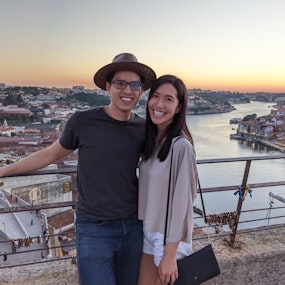
Kathleen and Richard Lo
Co-Founders
Richard and Kathleen Lo are the husband-wife duo behind Bordr, your trusted partner in Portugal. After traveling the world as digital nomads and then experiencing the challenges of moving to Portugal, they realized that they could offer a better experience for others doing the same. Bordr is the outcome of those early discussions and they are excited to offer the service that they wish they had when they first landed in Portugal.





































